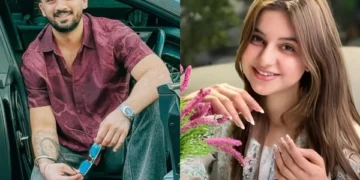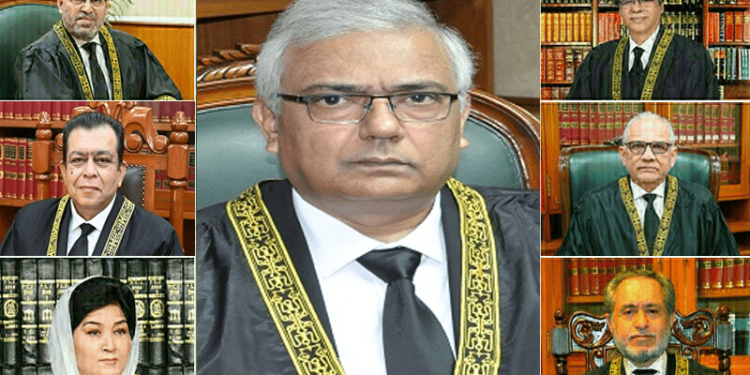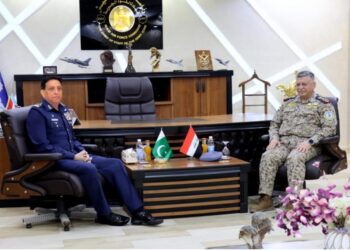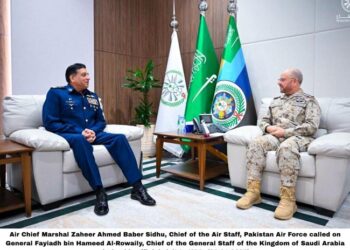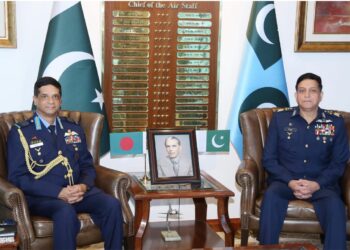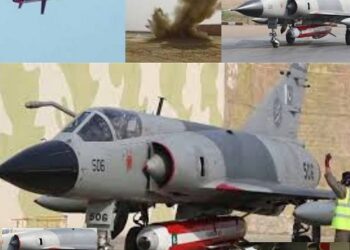Justice Masarat Hilali, a member of the Constitutional Bench of the Supreme Court, has said that the trial of civilians in military courts was for the trial of criminals like APS. Can all civilians be treated the same as in the Army Public School tragedy?
A 7-member constitutional bench headed by Justice Aminuddin Khan heard the case related to the trial of civilians in military courts.
Defense Ministry lawyer Khawaja Haris appeared in the court and continued his arguments, taking the position that the basis of the court decision is Articles 8, 5 and 8, 3, which are different and cannot be combined.
Justice Jamal Khan Mandokhel remarked that your point has been understood yesterday, go ahead and complete the remaining arguments, Justice Muhammad Ali Mazhar remarked that you were reading the paragraph from Justice Munib’s decision, start from the same one, Article 233 protects fundamental rights.
Justice Jamal Mandokhel remarked that even according to the constitution, rules are suspended, not terminated, rights cannot be suspended even according to Article 5.
Khoja Haris said that Article 233 has two parts, one for the armed forces and the other for civilians. Khoja Haris read the decision declaring the military trial of civilians null and void and took the position that it had been decided in the FB Ali case that civilians can also be tried in a military court, Articles 83 and 85 were misinterpreted in the majority decision.
Justice Jamal Mandokhel remarked that let’s see, whether we agree with you on this or not, Khawaja Haris said that it was said on the basis of a misinterpretation that the FB Ali case was of a different nature, FB Ali was tried after retirement when he was a civilian, the decision said that he was not retired when the crime was committed, therefore his case is different.
Justice Jamal Khan Mandokhel remarked that in the present case, the accused of May 9 do not belong to the armed forces, nowadays there is a term of ex-servicemen, they were not even ex-servicemen, let’s just use the term of civilians. Can civilians be tried in the Army Act or not or was it only for specific citizens?
Khawaja Haris said that the general impression is different from this, Justice Jamal remarked that let’s leave the general impression and tell us whether civilians can be tried or not?
Justice Musarat Hilali remarked that the trial of civilians in military courts was for the trial of criminals like APS, can all civilians be treated the same as in the Army Public School tragedy? Are all fundamental rights suspended when they come under the Army Act? The Constitution of Pakistan is not suspended.
Khawaja Haris said that fundamental rights remain, about which there are court decisions, Justice Muhammad Ali Mazhar asked what is the international practice in this? Do you have any example of this? Khawaja Haris replied that I have examples, I will discuss this later.
Justice Jamal Khan Mandokhel inquired that many of our youth are martyred, we have the feeling of martyrs, the question is, will there be a military trial of those who attacked them? What are the cases that will be tried in military courts under Clause 3 of Article 8?
Khawaja Haris said that in this case, we are not looking at which people may be tried in the future.
Justice Naeem Akhtar Afghan, while talking to Khawaja Haris, said that Khawaja Sahib, it seems that your preparation is not complete. The 5-member bench has repealed some sections of the Army Act. If we also keep these sections repealed, then there can be no military trial of civilians. If we reach any other conclusion, we will have to decide which civilians can have a military trial. Now the Official Secrets Act has also been amended in 2023. Tell us in the light of this amendment. Yesterday, Justice Jamal Mandokhel asked the question by giving the example of a military post.
Justice Jamal Mandokhel remarked that the authority of the Parliament is unquestionable, it can make a law that says what is a crime, if the Parliament wants, it can make a law tomorrow. Looking sideways is a crime. It is also the constitutional responsibility of the Parliament to establish a court where the trial of this crime will take place. The Constitution of Pakistan gives this authority and responsibility to the Parliament. It is said that the Parliament is supreme. In my opinion, the Constitution is supreme. The court adjourned the hearing of the appeals of civilians against the trial decision in military courts until tomorrow. Defense Ministry lawyer Khawaja Haris will continue his arguments tomorrow as well.
At the end of the hearing, Hafizullah Niazi came to the rostrum. The court called the Additional Advocate General Punjab to the rostrum.
The Additional Advocate General of Punjab presented a report in the court and said that there were 27 criminals in the May 9 tragedy, out of which two have been released, there are now 25 criminals in Punjab jails, all criminals are being provided equal rights, families have been allowed to meet the criminals twice in 10 days, the criminals are also getting food from home.
Hafeezullah Niazi said that the meeting has been arranged but no one has been allowed to meet except the mother, father and siblings, these prisoners are not allowed to go out like ordinary prisoners.
Justice Muhammad Ali Mazhar remarked that you yourself are admitting that meetings are also being held and food from home is also being provided, what else do you want? Why did you exaggerate things so much?
Justice Jamal Khan Mandokhel remarked that I myself have been in jail for 14 days. I used to let him out after morning prayers. Some prisoners also used to play games etc. Justice Muhammad Ali Mazhar told Justice Jamal Khan Mandokhel that he would give special concessions only for you.
The Additional Advocate General took the stand that all prisoners in jail have rights, Justice Musarat Hilali remarked that what is the problem with allowing prisoners to go out and sunbathe? The Additional Advocate General of Punjab said that they will be allowed to go out and all prisoners will be taken care of.









